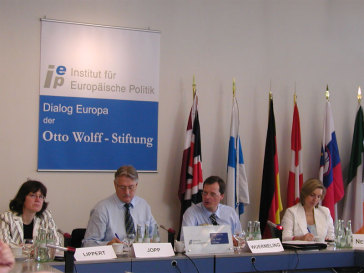IEP Lunch Debate with Dr. Joachim WUERMELING: “From Internal Market to Economic Patriotism?”

The European internal market has become the “centrepiece” of European integration but is in some ways still an incomplete project of the Union, explainedDr. Joachim WUERMELING, State Secretary in the German Federal Ministry for Economics and Technology. Because the success of European integration depends decisively on the increase in the standard of living through the common market, attention must again be dedicated to the original goal of a realisation of the four basic freedoms (free movement of goods, persons, capital and services). During a time in which the member states are confronted with poor economic data and the strong fear of globalisation among their populations, a complete realisation of the European internal market will only become more difficult. Thus, the EU member states, today more than ever, must react to new internal and external challenges and adapt and shape the single European market accordingly. In the end, strategic national goal-setting and economic growth, the fight against unemployment and the security of economic competitiveness are all closely connected to the European internal market, Wuermeling emhasised.
From the German perspective, the European internal market is a success story. Still, the many positive aspects are too little appreciated, and the perceived dangers rather than the real dangers of the internal market are frequently pointed out. Here, Wuermeling identified achievements such as the creation of 2.5 million new jobs Europe-wide, which since 1992 are a direct result of the completion of the internal market. Furthermore, through the European internal market, German exports have doubled in the last 10 years. Particularly the Eastern Enlargement brought for Germany a surge in its exports. In the first quarter of 2006 alone, trade in goods with these countries grew by 27 percent according to the Federal Statistical Office. Moreover, the further liberalisation of national markets means cost reductions for enterprises and consumers, Wuermeling explained. This has resulted in benefits for the consumer in the form of price cuts in the areas of telecommunication and radio providers, spurred by increased competition. Similar cuts in the future are also being pursued in the provision of gas and energy. Medium-sized firms also experience significant economic advantages from transnational trade. However, among these economic actors “hidden economic patriotism” has shown itself to be especially destructive. The prevention of the free movement of persons, services and goods, as well as the existence of often complicated application processes, makes it considerably more difficult for small- and medium-sized firms to do business across borders. The German federal government will seek to broach these and other issues during their EU Council Presidency next year. A “Paper on Internal Market Strategy” is currently being prepared for exactly that purpose, says Wuermeling.
While establishing the goal of a common market in the 1980s and 1990s hardly experienced any criticism at the time, the context today for its further development is much more difficult. Wuermeling lamented the fact that internal market policy is currently understood mainly as overregulation and that the member states are increasingly leaning toward protectionism and the “sweet poison” of so-called “economic patriotism”. One of the tasks of the federal government is therefore to promote better legislation and a streamlined bureaucracy and to prevent national intervention in mergers as much as possible. In addition, the creation of European “champions” is a positive and necessary long-term consequence of the European internal market.
Wuermeling explained that the European internal market is strengthening competition between enterprises within the Union and is thus optimally preparing them for global competition. This dynamism could represent a common European answer to globalisation. Accordingly, Wuermeling viewed a stronger appreciation for global markets in the further development of the European internal market as decisive. The common market could continue to be an attractive location for foreign investment if bureaucratic burdens for European companies are dismantled and all regulations, such as the European subsidy right, are reconsidered in terms of their global suitability to promoting competition.
In his concluding words, Wuermeling emphasised that the European internal market does not require complete harmonisation, neither in the areas of environmental and consumer protection nor in the areas of tax regulations and social policy. The diversity of national stipulations and the related European-wide competitive environment is very much desired and is the “trump card” of the common market.
By: Gesa-Stefanie Kuhle
